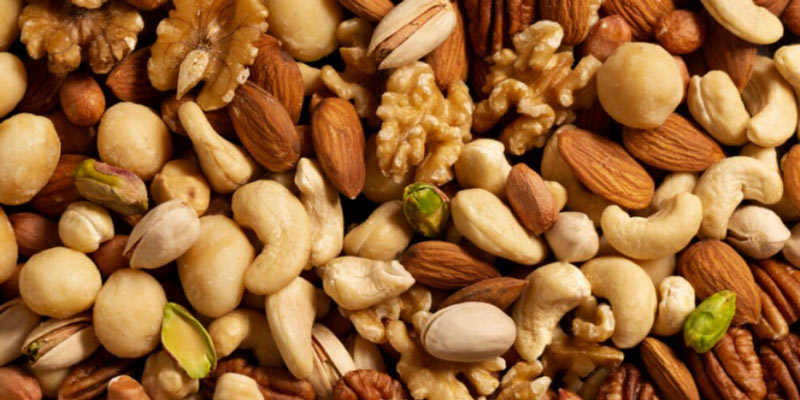Discover These 9 Dietary Minerals And Foods That Contain Them
Feb 29, 2024 By Nancy Miller
Entering the world of nutrition requires one to recognise the critical, yet often overlooked, influence of trace elements on physiology. In this light, these little nutrients, which serve as fuel for a large number of organs, have the potential to make or break (our health and well-being). We will look deeply into these minerals, providing key details and determining which dietary sources contain these beneficial components.
9 Dietary Minerals And Foods High In Them
Below you can find the nine dietary minerals and the foods which can provide you all of these minerals in good amount:
Copper: A Multifaceted Mineral
Copper is essential in bone strength, vascular health, antioxidant reactions, and energy generation processes. Copper is necessary for the formation of healthy red blood cells as well as the maintenance of healthy mental and immune system functions. The relationship between copper and iron is critical since copper is a component that assists in the appropriate absorption and usage of iron, indicating the link between these trace minerals.
Source: Copper may be produced from organ meats, shellfish, nuts, seeds, and whole grains, as well as dark chocolate and dried fruits. It is another way to add copper to your dietary plan.

Iron: the oxygen carrier
Iron is the main component in the production of hemoglobin. Hemoglobin is a protein component that regulates oxygen transport throughout the blood. Its effects are so broad that it aids digestion, hormone synthesis, and energy metabolism. Lower levels of iron in the body can develop anemia. It is a loss of strength and a weaker immune system. So, the right amount of iron is very important for the body.
Source: You can find iron supplements like spinach, lentils, and quinoa with vitamin C-rich foods like oranges, strawberries, or bell peppers. You may easily increase your iron consumption from plant sources.
Zinc: The Immune System's Alliance.
Zinc's importance is demonstrated by its activities in enhancing the immune system, promoting wound healing, and assisting with DNA synthesis and cell division. It is also a vital vitamin for experiencing taste and fragrance, making it an important part of a healthy lifestyle.
Source: You can find zinc in pumpkin seeds, quinoa, and yogurt. You should incorporate them into your diet to satisfy your daily zinc requirements. It is a mineral that improves immune system function and healing processes.

Selenium: the antioxidant powerhouse.
Selenium's antioxidant activity is one of many. It regulates thyroid function and protects against infections. This trace element has become more important in treating heart illnesses and reduces the risk of memory loss and thyroid disease.
Source: Selenium may be found in turkey, chicken, and sunflower seeds, as well as Brazil nuts and seafood. All these can help keep selenium levels high by increasing the antioxidant defense system.
Manganese: A Metabolic Regulator.
Manganese has qualities that are necessary not only for metabolism and bone building but also help in wound healing and regulating blood sugar levels. This essential mineral trace ingredient is required for the nerve and brain systems to function correctly.
Source: Add manganese to your daily diet with vegetables such as pineapple, almonds, and sweet potatoes, and watch your metabolism and health improve.
Chromium: Blood Sugar Level Controller
Chromium primarily improves insulin function, which contributes to consistent energy release. As a result, it is an essential component for persons who are currently diabetic or are at risk of developing the disease. As a result, this mineral, the trace element, is crucial in the digestion of macronutrients, such as energy synthesis, which affects an individual's metabolism.
Source: Whole grains such as brown rice, green beans, and tomatoes have a decent amount of chromium, which helps control blood sugar appropriately. Meat and fish contain chromium, although in minute amounts.
Molybdenum: An Enzymatic Aid.
Understanding the role of molybdenum in enzyme activity is crucial since it helps detoxify sulfites in our bodies and reduces the accumulation of toxic pollutants. Zinc is a precious mineral because of its function in metabolic processes and its ability to help the body detoxify.
Source: Consuming peas, lentils, and soy-containing items will improve your molybdenum intake, increase toxin-detoxifying capabilities, and maintain good bodily health.
Iodine, The Thyroid Regulator
Iodine is essential to thyroid health since it stimulates growth, development, and metabolism. Deprivation from it may be extremely harmful to human health, resulting in issues such as goiter and an increased risk of walking and speech impairments in youngsters.
Source: While salt and seafood are high in iodine and are beneficial to the thyroid gland and general metabolism, dairy products and eggs are other possible sources of iodine.
Fluoride: Protector of Teeth and Bones
Fluoride is commonly recognised as a vital component of dental care, but its importance to bone health should not be overlooked. This mineral, however, may aid dental health and bone strengthening, which contributes to the functioning of the entire skeletal system and is essential for keeping the body healthy.
Source: Among many places for Fluoride, Fluoridated water and nutritious foods such as fish should be taken into consideration because they provide Fluoride, thus effectively preventing tooth decay and bone "mass" loss.
Conclusion
Along with other elements, nutrition has a sensitivity to the elements of trace minerals. The deficiencies of these minerals usually affect our nutritional balance, which adds complexity to our optimal function and well-being. Thus, the combination of different and the right amount of foods makes this the most important way of identifying good nutrition. Through this, we attempt to fulfill the proportions of these essential elements to life. Understanding the role and importance of each mineral is very crucial. These minerals can help you live a healthy life and positively influence your life.







